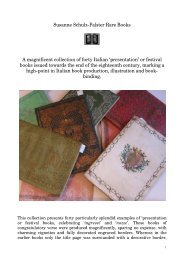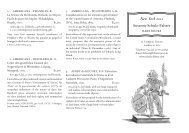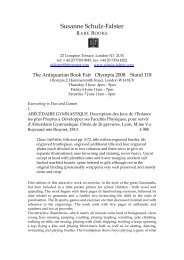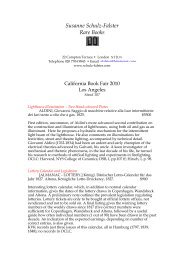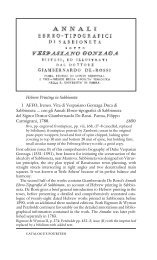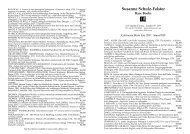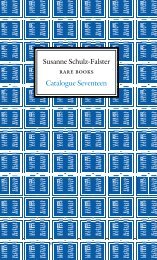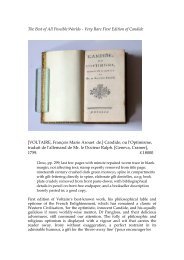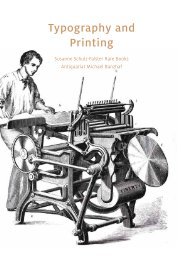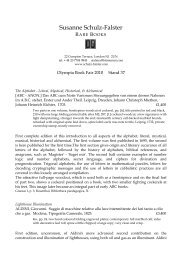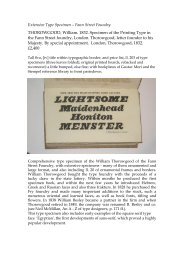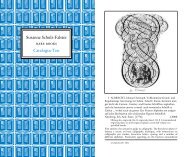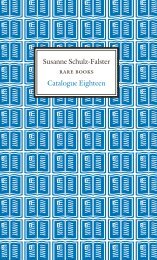Catalogue Number 12 - Susanne Schulz-Falster
Catalogue Number 12 - Susanne Schulz-Falster
Catalogue Number 12 - Susanne Schulz-Falster
You also want an ePaper? Increase the reach of your titles
YUMPU automatically turns print PDFs into web optimized ePapers that Google loves.
First Amsterdam Edition<br />
73 ROUSSEAU, J. J. Emile, ou de l’éducation. Selon la copie<br />
de Paris. No place (i.e. Amsterdam, J. Néaulme), 1762. £950<br />
Four parts bound in two volumes, 8vo, pp. [iv], viii, 224; [iv], 192;<br />
[iv], 168; [iv], 243; with an engraved frontispiece and Wve engraved<br />
plates by J. v. Schley and S. Fokke after C. Eisen; volume I with a small<br />
dampstain in the upper blank margin; occasional dust-soiling;<br />
contemporary polished calf, gilt ornamental border on sides, gilt back<br />
with raised bands and gilt lettering; expert repairs to head and foot of<br />
spines; a good copy with some pencil annotations in the blank margins.<br />
First Amsterdam edition, of Rousseau’s Émile, one of the most inXuential<br />
texts in the history of Western education. The Amsterdam printing is especially<br />
rare, since it was banned before publication.<br />
Émile represents to a large extent a synthesis and continuation of<br />
Montaigne and Locke. The attack launched upon it by church and state – it<br />
was banned by the archbishop of Paris, by the Sorbonne and by the civil<br />
government – centred, however not on Rousseau’s pedagogical theory, but<br />
on his statement on natural religion, which he proposed to substitute for<br />
the dogma of revealed religion. Few books have had greater immediate<br />
eVect on educational thought than Rousseau’s Emile. Its ideas fused with<br />
those of radical and scientiWc thinkers to create new insights into children,<br />
into methods of teaching and into the scope of the educational process, and<br />
these gave new directions to educational thought.<br />
Though the printing history of this book is extremely complicated, the<br />
most recent research by McEachern indicates that the Wrst edition was published<br />
the same year in Paris by Duchesne, though with the imprint ‘Amsterdam,<br />
J. Néaulme’. That edition was banned almost immediately, on<br />
June 9th, 1762 and soon afterwards Rousseau was forced into exile. The<br />
present edition was indeed printed by Néaulme, with the approval of both<br />
Rousseau and Duchesne. It was copied from the sheets of Duchesne’s<br />
<strong>12</strong>mo edition, and intended for distribution outside France, in particular in<br />
the Netherlands and Great Britain. The correspondence between Néaulme<br />
and Rousseau shows that the latter revised and corrected at least part of the<br />
sheets. Because Duchesne had published his edition some months earlier<br />
with the false imprint ‘A Amsterdam, chez J. Néaulme’, Néaulme was called<br />
before the Dutch magistrates, where he had to explain that he had not<br />
printed that edition but that he had printed the work now and had obtained<br />
a privilège for it. He was then immediately prohibited from delivering a<br />
single copy and was requested to submit two copies to the authorities for<br />
examination. Shortly afterwards, Néaulme’s privilège was withdrawn and<br />
all sales of Émile were forbidden. Thus Émile was banned in Holland before<br />
Néaulme had sold a single copy of his edition there.<br />
McEachern, nr. 2; Dufour 195; Le Petit, p. 563–4; Peignot, ii, p. 94.<br />
susanne schulz-falster rare books catalogue twelve<br />
74 [ROUSSEAU.] CLAPAREDE, David. Considerations sur les<br />
Miracles de l’Evangile, pour servir de Response aux DiYcultés de<br />
Mr. J. J. Rousseau dans sa 3.e Lettre Ecrite de la Montagne. Geneve,<br />
Claude Philibert, 1765. £280<br />
8vo, pp. xi, [I], 251; uncut in the original marbled wrappers, rebacked<br />
and somewhat dog-eared; with book-plate of H. Tronchin on front<br />
paste-down.<br />
First and only edition of Claparede’s well-reasoned critique of Rousseau’s<br />
theories on miracles. Claparede (1727–1801), Genevan professor of theology,<br />
maintains ‘Rousseau n’admet ni ne rejette les miracles; il nie que notre<br />
Seigneur les ait employés comme une preuve de sa mission; il entasse des<br />
diYcultés contre ce genre de preuve; quelquefois même il employe la<br />
raillerie, cette arme favorite des Incrédules’ p. v-vi).<br />
Cioranescu 19716.<br />
Critique of Rousseau’s Emile<br />
75 [ROUSSEAU. GERDIL, Hyacinthe-Sigismond.] ReXexions<br />
Sur la Théorie, & la Pratique de l’Education contre les principes de<br />
Mr. Rousseau par le P.G.B. Turin, Chez les Frères Reycends, &<br />
Guibert, 1763. £800<br />
8vo, pp. 192, contemporary vellum covering marbled boards; corners<br />
a little bumped, else Wne; shelf mark in ink to front paste-down,<br />
eighteenth century ownership inscription by marquis Mayan?; a good<br />
copy.<br />
Rare Wrst edition and one of the author’s most important books, a critical<br />
and detailed exposition of Rousseau’s educational principles as expounded<br />
in his Émile. The work is an attempt to expose the fallacies and contradictions<br />
in Rousseau’s work and argues in favour of an education based on ‘des<br />
principes plus conformes à l’esprit du genre humain et à la paix des familles’.<br />
Amongst the numerous publications criticial of his ideas, Rousseau deemed<br />
this the only one worth reading and studying: ‘Voila l’unique écrit publié<br />
contre moi que j’ai trouvé digne d’être lu en entier.’<br />
The cardinal Hyacinthe-Sigismond Gerdil (1718–1802) was a member<br />
of many scientiWc and literary institutions throughout Europe, such as Bologna,<br />
Turin, London, etc. and a tireless opponent of the Enlightenment<br />
and its intellectual origins. His learning was immense and he wrote on a<br />
wide range of subjects, in general defending the rights of the church and the<br />
Christian truth. He was one of the most strident defenders of catholic philosophy<br />
during the enlightenment.<br />
Conlon, Ouvrages Français relatifs à Jean-Jacques Rousseau 1751–1799. Bibliographie<br />
Chronologique, 242; Conlon 63:868; Melzi, ii, p. 416; Barbier, iv, 156.



